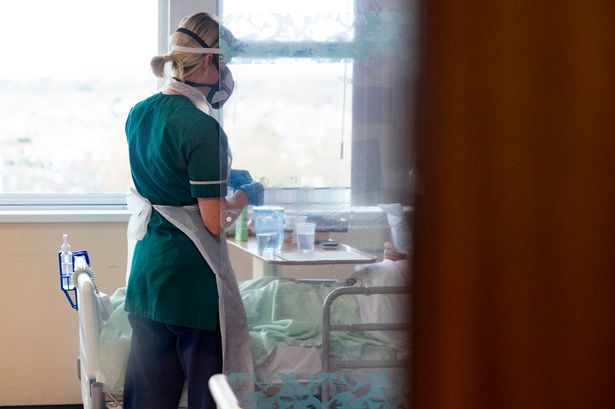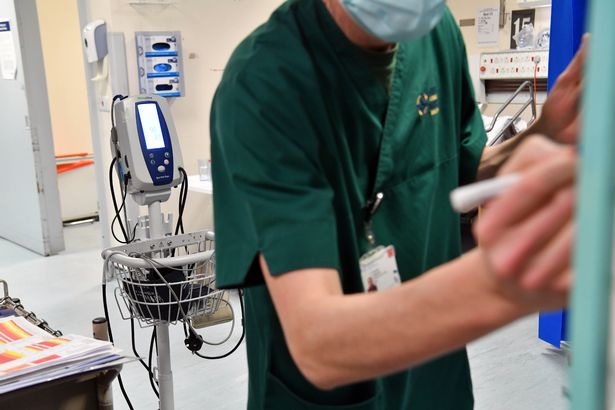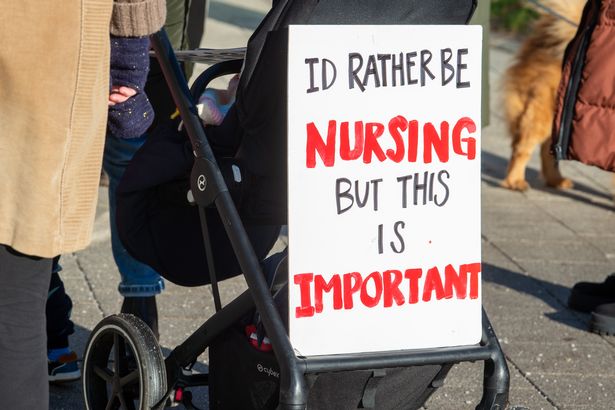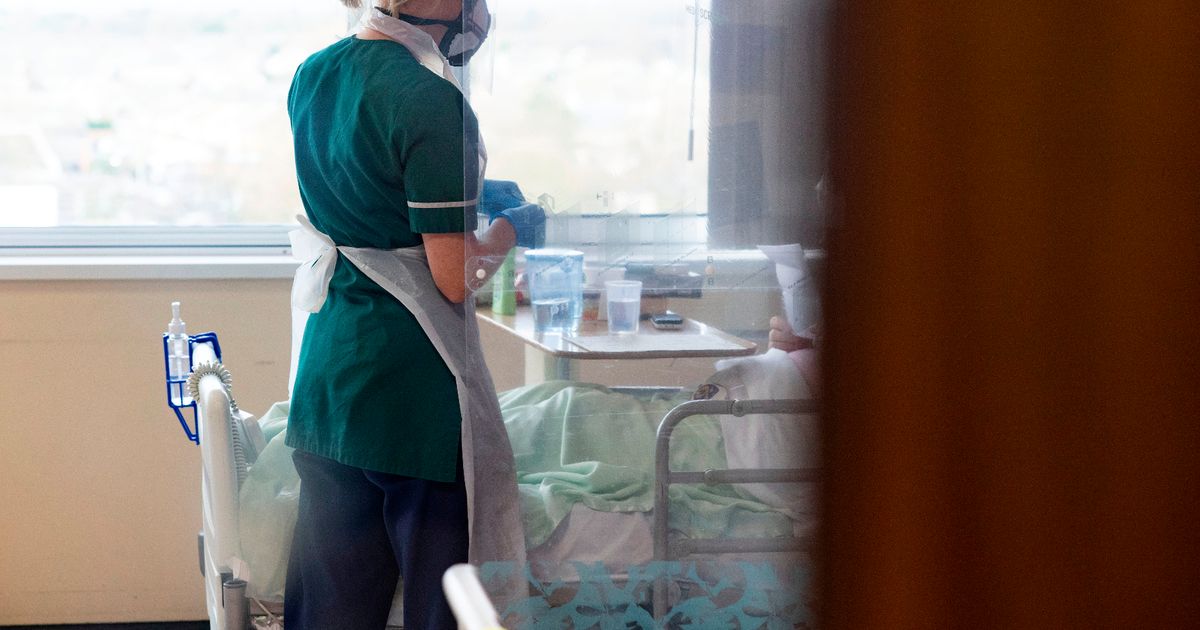‘While working as a nurse I’ve been bitten in the head, I was then asked if I really had to go to A&E because it would leave the ward short-staffed’ Reports of abusive behaviour since 2021 have jumped by almost a third(Image: James Maloney/Lancs Live)
Reports of abusive behaviour since 2021 have jumped by almost a third(Image: James Maloney/Lancs Live)
North west nurses are debating sanctions against those who attack NHS staff.
The move comes amid horror stories of workers getting abused ‘on a daily basis’. One nurse has recalled how she has been punched, bitten, told by a patient they would ‘happily kill’ her, and had to work a shift while concussed after being attacked.
Thousands of Royal College of Nursing (RCN) members from across the country were called back to a congress in Liverpool for the first time since 2019. They debated violence against nursing staff and how employers and the government can be best held accountable.
Solutions up for discussion included sanctioning patients who are aggressive to staff.
The Manchester Evening News spoke to Karen, who attended the conference, who works in Cheshire. She’s in her 40s, and qualified as a mental health nurse last year after dreaming for years of working as a nurse. But after only a year on the job, she has been left physically and mentally scarred.
Karen said: “I’ve been punched in the head numerous times, I was bank at the time while doing my studies but I had to go back to work with concussion because I needed to get paid. I also had to go into placements with concussion because I would lose my hours otherwise.
“While working as a nurse I’ve also been bitten in the head, I was then asked if I really had to go to A&E because it would leave the ward short-staffed.
“I’ve been intimidated, pushed and shoved by both patients and their families. I’ve been told by one patient that they would ‘quite happily kill me’. I have scratches all over my body. I am verbally, physically, racially assaulted on a daily basis.”
 Reports of physical assaults, verbal abuse and other anti-social behaviour towards hospital staff have risen by 31 per cent in just three years(Image: WalesOnline/ Rob Browne)
Reports of physical assaults, verbal abuse and other anti-social behaviour towards hospital staff have risen by 31 per cent in just three years(Image: WalesOnline/ Rob Browne)
Data released in the NHS Staff Survey 2024 revealed around one in five registered nurses and midwives in the region, and a third of nursing and healthcare assistants have reported they have been the target of physical violence in the workplace.
Reports of physical assaults, verbal abuse and other anti-social behaviour towards hospital staff have risen by 31 per cent in just three years since 2021.
“Nursing was something I always wanted to do. I was a young single mum so didn’t go to college and was never able to go to university, and went into administration jobs,” said Karen.
“During the pandemic, I thought ‘life’s too short’, I should do it.
“Now I’m concerned about the future of mental health nursing as well as my own future. I’m not 18-years-old, I’m mature, my body and my mind is only going to be able to take so much.”
The union says all health and social care employers have a legal duty to protect staff and take steps to prevent assaults. However, in the last five years, the Health and Safety Executive has found many NHS organisations failing in their duty to manage risk, according to the RCN.
Those working in acute care such as A&E, specialties in hospital, mental health, and as part of the ambulance service, are exposed to a high level of risk of violence and abuse, the NHS also states.
 The Royal College of Nursing says violence and aggression towards NHS staff should not be normalised(Image: Martin O’Callaghan / Birmingham Live)
The Royal College of Nursing says violence and aggression towards NHS staff should not be normalised(Image: Martin O’Callaghan / Birmingham Live)
Karen says nurses contact the police, but feels very little is done about the violence and aggression even when the police get involved.
“We see frontline staff getting it across the board. But it’s even more normalised because it’s in a mental health setting and it shouldn’t be,” explains Karen.
“It’s quite upsetting that we’re not better supported by our employers. It’s not acceptable for anyone to be in fear at work, even if they work in mental health.
“It really puts you off. I love my job but I can’t do my best because I’ve got that fear I’m going to be assaulted all the time.
“There’s only so much trauma anyone can take, it leaves you feeling like ‘do I really want to do this?’ We don’t get paid that much, not enough for this at least.”
Mental health nursing’s reputation as a known target for violence has done little to encourage people into a desperately short-staffed specialism.
“As mental health nurses we’re trained to restrain people when things get really violent, but because we’re short-staffed a lot of bank and agency workers we use don’t have that training,” says Karen. And often you don’t want to put yourself at risk anyway.
Karen feels sanctions will benefit staff in the rest of the hospital, but not necessarily those working in mental health.
“Until we get more staffing with enough training in place, its going to be difficult. And we need the support from the police,” Karen shares.
“With anybody else, in any other part of the hospital, the violence and aggression we experience would be taken more seriously.
“We often can’t discharge patients from mental health units because they will assault someone in public. But that aggression is then just taken out on us and there’s no consequences inside the unit because it’s just put down to a patient’s poor mental health.”
In December, the NHS issued its new violence prevention and reduction strategy amid the huge rise in incidents against staff, with many people urging that the zero-tolerance policy should be rigorously enforced.
The M.E.N. spoke to a number of nursing staff soon after the strategy was published.
“The problem is – you can say that it’s zero-tolerance, but if a patient does return and needs medical attention, we have to treat them,” said one nurse.
“Saying to those people ‘no, you’ve got to leave’ is hard, so it’s difficult to enforce that sort of policy.”
“It’s frustrating because you go into health care to treat, not to say no,” added another. “Patients can be barred from hospitals, where they can only attend if they’re life-threateningly unwell.
“But then time and again that happens, the patient gets better, and then they become violent again. It happens every day.”
